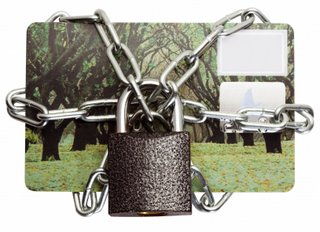Archive for the ‘credit cards’ Category
Friday, June 20th, 2008
Q:
Hello,
I have a question in regards to bankruptcy. I have just recently discharged my chapter 13 bankruptcy. I was curious how long it will be on my credit report. I have looked all over the web and found different answers to this. I also was curious what was recommended to re-establish some credit. I currently don’t have any credit reporting on my credit report. The bankruptcy said I should be able to re-establish credit right a way.
Thanks,
Julie
A:
Hi Julie,
Thanks for the question. Bankruptcy can be confusing at times with how long is stays on your credit report. Chapter 13 bankruptcy will be on your credit report for 7 years from file date. You will need to check your credit report because the bureaus usually don’t update this properly. After filing bankruptcy and it has been discharged, getting your credit rebuilt is your next step. The best way to do this is with secured credit cards. You can go to our credit card tab and apply for some credit cards there. We recommend Orchard Bank Card as your first choice. You should have at least 2 credit cards to get your credit scores boosted.
CreditScoreQuick.com
Posted in bankruptcy, credit cards, free credit score reports | Comments Off
Monday, June 16th, 2008
 With all the changes in the lending industry, you would think that no one can get a loan anymore. Conventional loans have gotten so tough most are going with FHA loans now. FHA has been the savior in a lot of crazy lending markets. With the current credit crunch and record foreclosures, FHA is now implementing risk based mortgage insurance premiums (MIP). This fee insures the loan with HUD. So just like anything else, if your credit score is low you will pay for it. In the past your credit score did not matter, but now it does. The way MIP worked in the past was everyone paid a 1.5% of the total loan amount in insurance. This upfront fee was financed in the note. The new mortgage insurance premium will range between (1.25% – 2.25%). So for borrowers with low credit scores you will now pay .75% more in premium. For borrowers with good credit they will save .25% in premium. With all the changes in the lending industry, you would think that no one can get a loan anymore. Conventional loans have gotten so tough most are going with FHA loans now. FHA has been the savior in a lot of crazy lending markets. With the current credit crunch and record foreclosures, FHA is now implementing risk based mortgage insurance premiums (MIP). This fee insures the loan with HUD. So just like anything else, if your credit score is low you will pay for it. In the past your credit score did not matter, but now it does. The way MIP worked in the past was everyone paid a 1.5% of the total loan amount in insurance. This upfront fee was financed in the note. The new mortgage insurance premium will range between (1.25% – 2.25%). So for borrowers with low credit scores you will now pay .75% more in premium. For borrowers with good credit they will save .25% in premium.
Examples:
Good Credit
• Sales Price: $100,000
• Down payment: $2,250
• Loan amount with MIP @ 1.25%: $98,971
Bad Credit
• Sales Price: $100,000
• Down payment: $2,250
• Loan amount with MIP @ 2.25%: $99,949

Depending on what your FICO score is, will determine how much you pay. You can see if your credit score is low, you will be financing more which will increase your payment as well. I believe this is just a tip of the ice berg with the changes in all sectors of lending. If you are getting ready to buy a home, you might consider pulling a recent copy of your credit report with scores to see where you stand. If you don’t want to pay more and feel that your have low credit scores, go ahead and take the plunge. Get your credit report and start working on any issues you may have. If you don’t fix your credit it will cost you unnecessary money long term. FHA is still the strongest loan in our current market, but with credit issues you will pay more for it. I have never seen such tightening up in the lending market like we currently are experiencing. I can’t say I don’t blame the banks, because everyone want there money back they have loaned out. I guess you would have to put yourself in their shoes, how would you feel if you loaned someone $100,000 and they did not pay it back to you?

Multiple FHA borrowers
With this new FHA change that was implemented on July 11, 2008 here is how this affects multiple borrowers. If two borrowers are involved on a FHA loan, the MIP will be based on the borrower with the lower credit score. So you could have one borrower with excellent credit, but have a borrower with low credit score that would cause a higher mortgage insurance premium for the entire loan.
CreditScoreQuick.com
Posted in credit cards, free credit check, free credit score reports | Comments Off
Friday, June 13th, 2008
Q:
Hello,
I need some advice on increasing my credit score. I currently have a 640 credit score. My goal is to get my score around a 720 or above. I currently have a credit card with Bank of America, and a credit card with American Express. I also have a car note around 350 a month.
Credit Card Balances and limits
- Bank of America limit is $10,000
- Bank of America balance is $7,500
- American Express limit is $15,000
- American Express balance is $9,852
I just recently bought my car 6 months ago. I paid $17,000 for the car. What do you recommend I do to get my scores around 720 or above. I dont have any collections or slow pays.
Robyn Leather
A:
Hi Robyn,
Credit card debt is one of the quickest ways to lower your credit scores. Amounts owed on credit is 30% of your credit score. The rule of thumb is to keep your credit card balances well below 30% of your allowed credit limit. It looks like your Bank of America credit card is well above 30% of the allowed credit limit. I would pay this card down as quick as possible. You should not have more than $3000 on this card at any given time. This is one reason why your credit score is low. Your American Express card has the same issue going on. You should not charge more than $4500 on this card as well. Both your credit card balances are bringing down your credit score. If you were to get both these cards below 30% of the allowed credit limit your credit scores should increase to around 720 or so.
CreditScoreQuick.com
CreditScoreQuick.com is the one of the most unique on-line resources for free credit score report, fico score, free credit check, identity theft protection, secured credit cards, student credit cards , credit cards, mortgage loans, auto loans, insurance, debt consolidation ,and a BlOG with a wealth of personal credit information. The information within this website is written by professionals that know about credit, and what determines ones credit worthiness.
Posted in credit cards, free credit report, free credit score reports | Comments Off
Wednesday, June 4th, 2008
 Q: Q:
Hello,
I had some questions in regards to credit cards. My wife and I had filed bankruptcy a while back. The bankruptcy was a Chapter 7. We got ourselves in trouble with credit card debt, but I am aware credit cards are necessary for good credit. How many credit cards should I apply for, and what type of credit card should I apply for with challenged credit. I pulled a credit report at your site, and our scores are in the low 600’s. Thanks for your help.
Tim
A:
Hi Tim,
This is a common question we get. Your overall credit score has many parts to it. Type of credit is 10% of your overall credit score. We always recommend a couple of credit cards to get the ball rolling. Most lenders like to see around 3 lines of credit reporting on your credit report for about 12 months or more. With good payment history your scores will go up. As far as what type of credit card, I would recommend trying to get a couple of our sub-prime cards. Below are some links to some good sub prime credit cards to get you in the right direction.
CreditScoreQuick.com



CreditScoreQuick.com is the one of the most unique on-line resources for free credit score report, fico score, free credit check, identity theft protection, secured credit cards, student credit cards , credit cards, mortgage loans, auto loans, insurance, debt consolidation ,and a BlOG with a wealth of personal credit information. The information within this website is written by professionals that know about credit, and what determines ones credit worthiness.
Posted in bad credit credit cards, credit cards | 1 Comment »
Tuesday, May 20th, 2008
Most educated consumers know about there FICO scores. That magical three digit number that lenders use to determine your credit risk. CreditScoreQuick has published here, an article about what determines your credit score. Many still wonder if closing credit cards or applying for a new credit card will affect their credit score.

Most consumers typically don’t know about the affects of doing what was mentioned, until it’s too late or by trial and error. In this article we want to make sure you know the affects of canceling good credit and opening too much credit too soon.
Canceling good credit cards
This is a mistake a lot of people make, and that is closing good credit card accounts. There is a misconception out there that when you close a credit card you loose your credit history with that card. This simply is not true. That history will be on your credit report for 7 years. Now there will not be any new credit history, and you also closed down a perfectly good line of credit which could lower your credit score. Fico likes to see a mix of credit, so if this was your only credit card, it more than likely hurt your scores as well.
Opening too much credit
Having too much credit does not hurt your credit score. Applying for a bunch of credit does hurt your fico scores. So for example, if you apply for a car, furniture loan, mortgage, and new credit cards all at once, you score will be lowered as a result. The fico score model sees too much credit too soon as a risk to the creditors. That is why your scores get dinged for it. Now if you are applying for a mortgage, the fico score model allows you to shop for a mortgage within a 30 day window, so fair Isaac’s scoring method allows you to shop your mortgage rate. This shopping within a 30 day window according to FICO counts as one inquiry.
So if you are getting ready to make a purchase and think you may have lowered your credit scores because of too many credit applications, go ahead and get a copy of your free credit score report to see where you stand.
About the Author: Mike Clover is the owner of http://www.creditscorequick.com/. CreditScoreQuick.com is the one of the most unique on-line resources for free credit score report, fico score, free credit check, identity theft protection, secured credit cards, student credit cards , credit cards, mortgage loans, auto loans, insurance, debt consolidation ,and a BlOG with a wealth of personal credit information. The information within this website is written by professionals that know about credit, and what determines ones credit worthiness.
Posted in credit cards, free credit score reports | Comments Off
Sunday, May 4th, 2008
 It looks like the government will be getting serious about credit card regulations. The Federal Reserve Board proposed rules to prohibit unfair practices regarding credit cards and overdraft services that would among other provisions, protect consumers from unexpected increases in the rate charged on pre-existing credit card balances. It looks like the government will be getting serious about credit card regulations. The Federal Reserve Board proposed rules to prohibit unfair practices regarding credit cards and overdraft services that would among other provisions, protect consumers from unexpected increases in the rate charged on pre-existing credit card balances.
Regulation AA (Unfair Acts or Practices)
The proposal would amend Regulation AA to prohibit unfair or deceptive acts or practices by banks in connection with credit card accounts and overdraft services for deposit accounts.

Credit Cards
• More Time To make Payments. The proposal would stop banks from treating a payment as late unless the consumer has been provided with reasonable amount of time to make that payment. There would be a new safe net for banks that send periodic statements at least 21 days prior to the payment due date.
• Allocation of Payments. When you have a credit card with different balances (for example, purchases, and cash advances), typically the annual percentage rate (APR) is higher on the cash advance. When you make a payment on a scenario like this the bank will apply your payment to the lower of the two. With the new regulation the payment will be split equally amongst the two balances. In addition, to enable consumers to receive the full benefit of discounted promotional rates (for example, on balance transfers), during the promotional period payments in excess of the minimum would have to be applied first to the balances on which the rate is not discounted.
• Two-Cycle Billing. The proposal would stop banks from imposing finance charges based on balances on days in billing cycles preceding the most recent billing cycle. Credit card issuers will not be allowed to use previous billing cycles to calculate interest on your current bill. Current double cycle billing uses the average balance from the previous two months to calculate interest charges, even if you paid part of the previous balance.
• Rate increases to existing balances. Credit Card companies will not be able to increase you APR on existing balances, unless you had a promotional offer and/or was late on a payment
• Less bait and switch credit card offers. The proposal would require banks making firm offers of credit advertising multiple APRs or credit limits to disclose exactly what the qualifications would be for those terms.
• Finance of Security Deposits and Fees. The proposal would address concerns regarding subprime credit cards by prohibiting banks from financing security deposits and fees for credit availability (such as account-opening fees or membership fees) if charges assessed during the first twelve months would exceed 50 percent of the initial credit limit. The proposal would also require financed security deposits and fees exceeding 25 percent of the initial credit limit to be spread over the first year.
• Credit Card Holds The proposal would prohibit banks from imposing a fee when the credit limit is exceeded solely because a hold was placed on available credit. This can occur where the final dollar amount of a transaction was not known in advance (for example, when a consumer checks into a hotel, a hold is placed for the expected cost of the stay).
Overdraft Services
• Debit Holds This proposal would stop banks from charging a fee when an overdraft takes place to due to a hold placed on available funds in an account.
• Right to opt out The proposal would stop banks from imposing a fee for paying overdraft unless the bank gave the consumer an opportunity to opt out of the payment of overdrafts and the consumer has not done so. This would apply to all transaction types. This would also be applied to overdrafts resulting from ATM and point of sale transactions.
Author: Mike Clover
CreditScoreQuick.com
Posted in credit cards | Comments Off
Monday, January 21st, 2008
If you are a first time home buyer, you more than likely don’t know what the process is. Most first time home buyers rely on a real estate agent to guide them a long. Here is the advice and tips that will make your home buying experience a good one.
First Step:
1. Find out what you qualify for. This is the most important part of the home buying process whether you are a first time home buyer, or someone upgrading to a bigger home. We know that getting the approval process done first is not as fun as looking at homes. But you could be wasting your time and everyone involved by not getting your finances in place first. I would recommend getting a current copy of your credit report with scores before calling a lender. Make sure you know your credit situation, so you are an educated home buyer.
Second Step:
2. Find a seasoned realtor that knows what they are doing. There are too many realtors in the real estate business that don’t have a clue when trying to find you a home. I would get a recommendation from you lender. They typically know who will get the job done for you. You don’t have to buy a home with a realtor that works for some big name brokerage. There are plenty of good realtors that work for small companies as well. Do some research?
Third Step:
3. Once you have secured financing with a reputable lender and have found a seasoned realtor, then you are ready to start the looking process. If a realtor takes you out and only wants to show you 4 to 5 homes and that is it, this is a sign that all they are interested in is a commission check. This is the biggest purchase of your life, it usually takes all day to look at homes and then make a decision. In some instances there may only be 4 to 5 homes to look because that is all that is available that meets your criteria. I am sure you get the idea though.
Fourth Step:
4. Close on your new home. Hopefully you have made the right decisions and got reputable and honest real estate professionals to make it happen for you.
Conclusion: Make sure you can buy first, and what type of loan you qualify for. This is essential so you will not be disappointed. You should also have selected seasoned and professional real estate service providers. Remember you are relying on real estate professionals to help you make the biggest purchase of your life.
About the Author: Mike Clover is the owner of http://www.creditscorequick.com/. CreditScoreQuick.com is the one of the most unique on-line resources for free credit score report, Internet identity theft software, secure credit cards, and a BlOG with a wealth of personal credit information. The information within this website is written by professionals that know about credit, and what determines ones credit worthiness.
Posted in FICO, credit cards, credit report, free credit score reports | Comments Off
Thursday, November 29th, 2007
If you’re applying for a loan or credit card, your credit score could have an impact on your interest rate and loan term. So what is your credit score and what does it mean? What does it say about you? Credit scoring is how creditors or lenders assess their risk when lending money to you. They look at your score and it indicates to them how financially responsible you have been in the past.
Your credit worthiness is calculated by credit scoring agencies and bureaus. You should get a copy of your credit score at least once a year and make sure that there are no mistakes or omissions in it. You can get this information for very little money and sometimes for free. Your actual score will be between 300 and 900. Higher scores are much better and can get you great interest rates, longer pay-off periods or terms, lower fees and less paperwork in the application process. Low scoring applicants are usually rejected all together or they are offered high interest rates, high minimum payments and more fees. Sometimes low scoring applicants are accepted based on their employment history or other factors, but generally aren’t as trustworthy as their higher scoring counterparts.
Is your score a good score? 650 or higher is a very good score and will generally earn you the very best terms when applying for loans. If there are a few minor problems with your credit history, such as a couple of late payments in the last few years, then you can score between 620 and 650, which is still a good score. You may run into a few problems with this score, but generally it is still pretty good. You’ll probably end up with slightly higher interest rates than people with excellent credit. Scoring under 620 puts you into a risky category. You may still be approved for a loan, but it will be at the highest interest rates and you may be considered a big risk to lenders.
Things that affect your credit score include your borrowed money payment history, late payments and missed payments. Late and missed payments on a credit card or loan are very big considerations when calculating your credit score. You should try to never make a late payment because it blemishes your record for years. Another thing considered when figuring your credit score is your debt to income ratio. If your level of debt is very high relative to your income, or if the cards you have are close to their spending limits, then your score will probably go down.
If your credit history is very long and you’ve had revolving credit for years, then your score may drop. Trouble paying things off completely makes you look like you are in over your head, or you’re just not trying to pay off your debts. Inquiries on your credit are another thing that is looked at. If you’re constantly applying for credit cards and loans, regardless of your acceptance or use of the instrument, then you look like someone who can’t afford the things that you’re trying desperately to get. Do your research before choosing a loan or credit card to apply for. Multiple inquiries on your credit can hurt you in the long run. Your credit score ultimately depends on you.
Author: Mike Clover
Posted in credit cards, credit worthy | Comments Off
Disclaimer: This information has been compiled and provided by CreditScoreQuick.com as an informational service to the public. While our goal is to provide information that will help consumers to manage their credit and debt, this information should not be considered legal advice. Such advice must be specific to the various circumstances of each person's situation, and the general information provided on these pages should not be used as a substitute for the advice of competent legal counsel.

|






